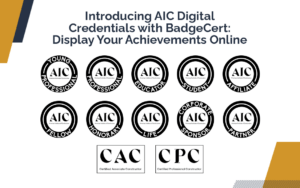Historically, the construction industry has been hurt by negative views on general practices and processes that stem from the actions of a few unethical people. That’s why AIC and its members are committed to a higher level of construction ethics.
Our organization seeks to accelerate construction excellence by proving that most businesses are above board, want to be open and transparent with their customers, and value integrity and hard work above all else.
The challenge is that high-profile news items continue to plague the reputation of the industry. For example, in April 2023, a construction company owner was sentenced to 78 months in prison and ordered to pay nearly $1 million because of his role in a bid-rigging scheme that targeted the California Department of Transportation (Caltrans).
“This sentence sends a strong message that criminals who corrupt the competitive bidding process will face stern consequences,” said Assistant Attorney General Jonathan Kanter of the U.S. Justice Department’s Antitrust Division.
This costly example of unethical dealings should send a strong message that ethics are critical in the construction industry, especially in the area of bidding.
Bid-Rigging: Why is it a Problem Area?
Bid-rigging, at its core, is the practice of manipulating the outcome of an open bidding session to skew in favor of a particular company or group. The scheme often involves an agreement between unethical contractors colluding to gain an advantage. It is highly unethical and is illegal in the United States.
There are many different forms of bid-rigging, and each is harmful to the integrity of the industry. The most common forms include the following:
- Cover bidding
- Bid rotation
- Bid suppression
- Non-conforming bid
- Phantom bidding
Each form of bid-rigging creates a false picture of pricing structures and makes competitive pricing impossible for buyers looking after their bottom line.
Cover Bidding
Cover bidding, also known as complementary bidding, is a process that involves several pre-determined losing bids that include unattractive terms or amounts.
The pre-selected winner is then priced higher than the rest but lacks the negative aspects, which makes it more enticing even though it might be above the usual cost. By including the others, it also creates an illusion of a competitive process even though it is not.
Bid Rotation
In this scenario, a team of bidders works together so that one of their members wins the project each time. The winner rotates through the group so that each has a turn at cashing in on a fraudulent higher-priced job.
Bid Suppression
By abstaining from the bidding process entirely, the colluding members make it easy for the agreed-upon winner to get the project no matter what because no one else is present to bid.
Non-Conforming Bid
This type of rigging looks like a normal bidding session where the companies make it appear like they just didn’t do their homework. Each submission that is not the pre-determined winner purposefully leaves out key aspects, purposely making certain contractors ineligible to win.
Phantom Bidding
Using outside help, this practice inflates the value of different parts of the project, which then causes the bid price to be artificially raised.
Lessons Learned from the Bid-Rigging Scandal in California
When any of the above-mentioned bid-rigging practices are in play, owners will pay substantially more for the work to be completed. And the work is often of lower quality because the best contractor for the job did not win the bid. The bid-rigging scandal in California illustrated the consequences of such unethical practices.
In this situation, the defendant recruited others to submit false bids in an effort to win the Caltrans bid. To ensure this practice flew under the radar, the contractor also bribed a Caltrans contract manager with cash, gifts, and services in an effort to defraud the state agency.
Because Caltrans receives federal funding and is reliant on taxpayer money, the FBI was involved in the investigation.
“Fair and free competition is essential to ensure taxpayer money is only obligated and spent on essential services and contracts,” said Sean Ragan of the FBI Sacramento Field Office. “The FBI is committed to working with our partners to investigate such allegations and bringing to justice those who conspire to enrich themselves by cheating the American public as a whole. We hope this sentence serves as ample warning to anyone contemplating a scheme to falsely influence a government bidding process for personal gain.”
In this case, not only did bid-rigging hurt the client and taxpayers, but it also contributed to more negative marks on the public image of the construction industry as a whole.
The AIC Code of Ethics Applied to Bid-Rigging
AIC is committed to upholding high standards and fair practices in the construction industry. We mandate that all members abide by the Constructor Code of Ethics to support ethical dealings. Among the seven key tenets that constructors must abide by, the following pertain directly to the practice of bid-rigging and explicitly go against it:
1. The Constructor shall maintain full regard to the public interest in fulfilling their professional responsibilities to the construction industry.
By cheating the system, an unethical constructor does not maintain their responsibilities to the industry as a whole. Missteps like these have a large impact on everyone.
2. Constructor shall not engage in any deceptive practice, or in any practice that creates an unfair advantage for the Constructor or another.
This point specifically highlights negative practices like bid-rigging. Creating unfair advantages goes against the entire idea of community that AIC strives to uphold.
3. A Constructor shall not maliciously or recklessly injure or attempt to injure the professional reputation of others.
When an unethical constructor asks others to collude, lie, or otherwise help them carry out their nefarious practices, they are bringing down everyone involved with them. The more it happens, the wider the net and the greater the damage to overall reputations.
These are just a few of the important anchor points AIC stresses in our Code of Ethics. We encourage AIC members and other members of the construction community to review the Code of Ethics on a regular basis to find guidance through difficult ethical challenges.
Follow Us on LinkedIn
Bid-rigging is just one of many ethical topics that constructors need to be aware of. We encourage you to follow us on LinkedIn to stay up-to-date on the latest important issues that affect constructors.
You’ll gain access to timely and helpful information about the role of ethics in construction. You’ll also have the opportunity to be part of a growing community of constructors that are committed to bettering the industry. Follow us today to learn more.




